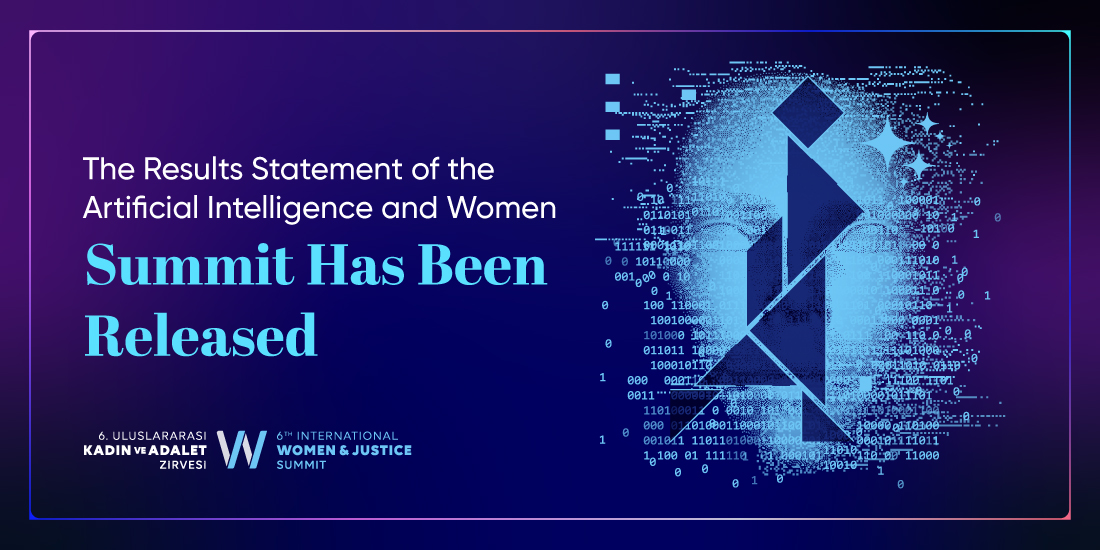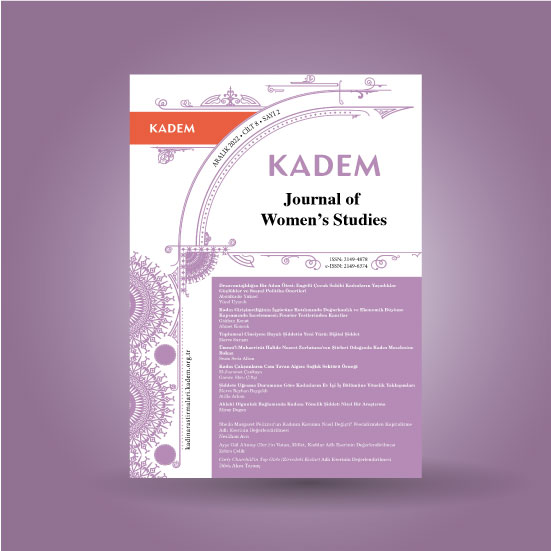THE RESULTS STATEMENT OF THE “ARTIFICIAL INTELLIGENCE AND WOMEN” SUMMIT ORGANIZED BY THE WOMEN AND DEMOCRACY FOUNDATION (KADEM) HAS BEEN RELEASED.
In the results statement of the 6th International Women and Justice Summit, organized by the Women and Democracy Foundation (KADEM) at Haliç University with the opening speech delivered by President Recep Tayyip Erdoğan, seven key recommendations for “Gender Justice in Artificial Intelligence” were highlighted.
The summit, attended by President Recep Tayyip Erdoğan, First Lady Emine Erdoğan, Minister of Family and Social Services Mahinur Özdemir Göktaş, ministers from guest countries, KADEM Chairperson of the Board of Trustees Sümeyye Erdoğan Bayraktar, and KADEM Chairperson of the Board of Directors Assoc. Prof. Dr. Saliha Okur Gümrükçüoğlu, featured discussions over two days with academicians, experts, and researchers from different countries on various topics surrounding the main theme of “Artificial Intelligence and Women.”

7 RECOMMENDATIONS IN THE RESULTS STATEMENT!
The results statement of the summit was declared by Dr. Betül Özel Çicek, Director of KADEM’s Advocacy and Research Department, and Dr. Ravza Altuntaş Çakır, a member of KADEM’s Academic Advisory Board.
The statement highlighted seven key topics. The recommendation titles are listed as follows:
- Investing in Gender-Sensitive Artificial Intelligence Initiatives
- Using Artificial Intelligence to Bridge the Gender Gap
- Reducing Bias in Artificial Intelligence
- Supporting Female Leadership in Artificial Intelligence
- Promoting Gender Justice in Research
- Creating a Best Practices Guide
- Democratic Law and Policy Making
A SUSTAINABLE PROGRESS GOAL THAT NOURISHES DEMOCRACY
At the end of the statement, it was emphasized: “By promoting the outlined action plan, we aim to foster sustainable and fair progress that nourishes democracy, not only through innovative but also inclusive artificial intelligence. This approach will ensure that artificial intelligence becomes a powerful tool for social transformation, benefiting all segments of society.”
A SUSTAINABLE PROGRESS GOAL THAT NOURISHES DEMOCRACY
At the end of the statement, it was emphasized: “By promoting the outlined action plan, we aim to foster sustainable and fair progress that nourishes democracy, not only through innovative but also inclusive artificial intelligence. This approach will ensure that artificial intelligence becomes a powerful tool for social transformation, benefiting all segments of society.”
Here is the full text of the results statement from the summit:
KADEM 6TH WOMEN AND JUSTICE SUMMIT “ARTIFICIAL INTELLIGENCE AND WOMEN” RESULTS STATEMENT
The 6th International Women and Justice Summit, held in 2024, provided a comprehensive platform to address the complex relationship between artificial intelligence technologies and gender justice under the theme “Artificial Intelligence and Women.” The summit consisted of six main sessions focused on the effects of artificial intelligence in various areas, such as knowledge production, social norms, ethical standards, policymaking, legal processes, and women’s welfare. These sessions fostered a critical dialogue on how artificial intelligence could either serve as a tool for achieving equality or deepen existing hierarchies and inequalities.
We are at a critical juncture where rapidly evolving technology is beginning to reshape our world. Artificial intelligence has moved beyond being a simple tool and has become an authoritarian force with the potential to control every aspect of life. This technological transformation brings with it the risk of technology, as an instrument of authority, spiraling out of control and becoming an end in itself.
We know that misogyny is a global issue, and patriarchal socio-cultural norms are not confined to any particular culture or country. This presents a serious problem that we must confront together. While artificial intelligence technologies can be used as a tool for social development, they can also function as instruments of discrimination and oppression. In this discussion, the role and representation of women are critically important in shaping the epistemologies and decision-making systems of the future.
To prevent artificial intelligence from functioning as an instrument of discrimination and oppression, we need to reinterpret AI with an interdisciplinary approach. We know that every piece of information is directly linked to power structures, and the transformation of AI from a tool to an end in itself is directly related to the acceleration of capitalist production. Our agenda aims to promote the creation of technologies that are sensitive to space, the world, humanity, and every layer of existence.
We are at the beginning of a great technological revolution that is reshaping our information systems. With this beginning, we have a unique opportunity to advance an egalitarian epistemology. We know that knowledge is never neutral; therefore, integrating women’s rights and demands into political, economic, and social processes is essential for diversity and inclusivity. The dual potential of artificial intelligence to both improve women’s lives and perpetuate gender bias urgently highlights the need for inclusive AI development.
Moreover, coding that is sensitive to space, the world, and natural resources will protect human dignity by supporting mutual life. To fully realize AI’s potential for good, we must address the root causes of bias, such as ignorance, insensitivity, and misinformation, and ensure that AI serves the benefit of all humanity.
In the fields of artificial intelligence and women’s studies, KADEM has launched a long-term initiative with a visionary perspective that goes beyond identifying issues to guide future applications and policies. As a women’s NGO, we advocate that AI be approached with a transformative perspective that advances gender justice while safeguarding human rights and fundamental freedoms. To achieve this, we call for a targeted action plan that will ensure women’s full participation, representation, and safety in the AI-focused digital ecosystem.
Some of our action proposals are as follows:
- Investment in Gender-Sensitive Artificial Intelligence Initiatives:
We call on decision-makers to allocate special funds for gender-sensitive AI initiatives. To use AI in a correct and beneficial way, it is essential to collect data on women’s issues and raise awareness in this regard. National digital policies should include comprehensive action plans that ensure the effective support and full integration of girls and women into the digital economy.
- Leveraging Artificial Intelligence to Bridge the Gender Gap:
Artificial intelligence has great potential to contribute to the empowerment of women, but this potential must be fully realized. Policies should be developed to prevent AI systems from reinforcing existing hierarchies and exacerbating inequalities. In this context, we emphasize the need for decisive actions to close the gender inequality gap and ensure that AI technologies support the principle of equality.
- Eliminating Biases in Artificial Intelligence:
It is essential to actively identify and eliminate stereotypes and discriminatory biases in AI systems. To prevent technology from reproducing and amplifying existing biases, proactive measures must be taken to address these issues. These steps should promote justice, equality, and inclusivity.
- Supporting Female Leadership in Artificial Intelligence:
It is important to encourage female entrepreneurship and leadership at every stage of the life cycle of AI systems. Through policies that create harassment-free environments and foster inclusive investments, women will be able to have a greater presence in the field of AI, increase their activities and innovative contributions, thereby enriching the field with diverse perspectives.
- Promoting Gender Justice in Research:
Gender justice in AI research — both in academia and industry — is critical for achieving fairness and inclusivity. We support initiatives that will increase the representation of women in AI research fields.
- Creation of a Best Practices Guide:
We propose the creation of a universally acceptable and applicable best practices guide that encourages and supports the participation of girls, women, and underrepresented groups at every stage of the development and implementation of artificial intelligence. This resource will serve as a valuable tool to promote inclusivity, equality, and best practices in the field of AI.
- Creation of Democratic Law and Policy:
An inclusive decision-making structure is essential to prevent biases from infiltrating policy processes. In the absence of representation, policies cannot address the needs of all groups or reflect their perspectives. This, in particular, can disproportionately affect women. Artificial intelligence governance frameworks must be built on ethical and democratic principles to ensure that AI serves all sectors of society in a fair, transparent, and accountable manner. Women’s rights should be prioritized in this process.
Conclusion:
The world we will live in the future will be determined by the artificial intelligence technologies we plan and discuss today.
By promoting the action plan outlined above, we aim to create not only an innovative but also an inclusive artificial intelligence environment, ensuring sustainable and just progress that nourishes democracy. This approach will make artificial intelligence a powerful tool for social transformation, benefiting all sectors of society and supporting innovations that will benefit individuals across all genders.
At the same time, it will ensure that the ethical, legal, and social impacts of artificial intelligence are addressed from a perspective that prioritizes justice, accountability, and transparency. This viewpoint will contribute to a more inclusive, dynamic, and forward-thinking digital world where all individuals and communities can thrive.



